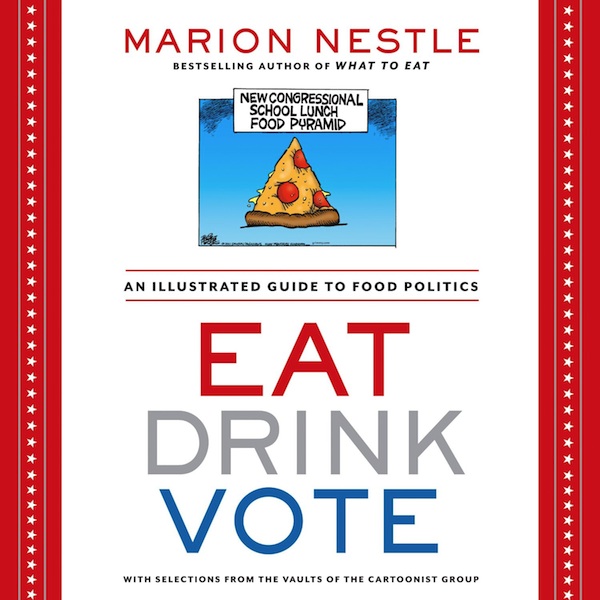Despite the dedicated work of doctors, bloggers, and health professionals everywhere, America remains one nation overweight. As we become more and more entrenched in a full fledged war against obesity, maybe the cartoonists will save us all. At least that’s what acclaimed diet and nutrition expert Marion Nestle hopes will happen with the release of her ninth book, “Eat, Drink, Vote: An Illustrated Guide to Food Politics.”
After a life time of publishing pointed literature on the subject of food politics, Nestle thought the humor of cartoons was the perfect medium. With over 250 of Nestle’s favorite food cartoons, she hopes to deliver cheeky and insightful criticisms at the food industry and its politics. She told USA Today that comics relay “complicated conceptual information at a glance, and if they are good, make it funny, sharp, ironic, and sometimes even sarcastic.” Our resident nutrition expert Mary Hartley, RD has followed Nestle’s career with great interest, and believes the lightheartedness of cartoons fit perfectly with Nestle’s sense of humor.
“For 50 years, Marion has provided an honest, practical, and a bit irreverent commentary on nutrition, and if she has a big box of nutrition cartoons, then I want to see them,” said Mary. Calling Nestle “the rare nutritional scientist who’s also in wide publication,” Mary said Nestle has spent a lifetime discussing food policy, social and environmental influences on food choices, the politics of food safety, and the effects of food industry marketing on children’s diets and health.
One of Nestle’s main bones with the food industry is advertising targeted at children and the extreme prevalence of fast food restaurants in America. Like Nestle, Mary believes these trends began in the ’80s, and in July she told me, “Between 1977 and 1991, the number of eating establishments in the U.S. increased by 75 percent. The public came to expect reasonably priced food served in large quantities.”
Nestle supports animal welfare and encourages people to buy locally grown, organic foods. This is partly because local and organic farms tend to be more kind to the environment, and also a way to sidestep the big food companies. Nestle claims large food corporations are more about reporting earnings to Wall Street than studying obesity statistics. “Marion is correct about food companies,” said Mary. “Their goal is to make money for investors; it is not to ensure public health. That is why the food industry is incapable of self-regulation when it comes to adhering to health-related recommendations.”
After a lifetime spent as the public’s mouthpiece for improving food standards, maybe Nestle’s book of funnies will put it in the right perspective.
Also Read:
The Color of Cutlery and How it Affects What We Eat
Top 10 Ways to Prevent Overeating
Decoding Nutrition Facts Labels
Image via amazon.com

